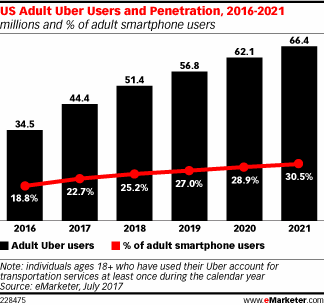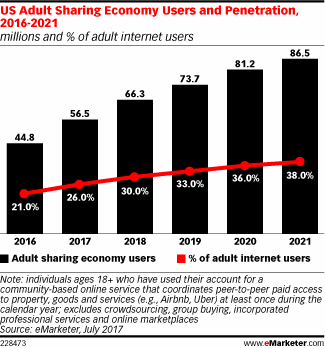56.5 million people will use a sharing economy service this year
As trust and familiarity with sharing economy services continues to grow, so too will the number of users.
According to eMarketer’s latest estimates, over a quarter (26.0%) of US adult internet users—or 56.5 million people—will use a sharing economy service at least once in 2017. This is a higher figure than previously projected due to stronger-than-expected uptake of both ride- and home-sharing services.
eMarketer’s definition of the sharing economy includes community-based online services that coordinate property, goods and services. It excludes crowdsourcing, group buying, incorporated professional services and online marketplaces like eBay.
For the first time, eMarketer’s forecast includes estimates for two of the most popular sharing economy services: Airbnb and Uber.
This year, 16.9% of US adult internet users are expected to use their Airbnb account at least once, equating to 36.8 million people.
By comparison, 20.4% of US adult internet users, or 44.4 million people, will book a ride on their Uber account at least once this year. Among adult smartphone users, that figure will rise to 22.7%.
Trust is still one of the biggest barriers to sharing economy adoption, particularly when it comes to lodging services. An April 2017 report from Maru/Matchbox found that 31% of US consumers did not consider home-sharing platforms like Airbnb to be safe, while 28% said the same about ride-hailing services.
However, as consumers become more comfortable with the sharing economy, the number of users will rise rapidly. Airbnb and Uber will be the biggest drivers of growth, though other sharing economy services will also gain users. This is especially true of the sharing transportation sector, where alternative services like Lyft already have notable traction.
by Jasmine Enberg


